Croatian dessert wines feature unique tastes that entice the taste buds like no other! These sweet offerings are full of flavor and aroma and provide an unforgettable experience for any wine enthusiast. Croatian winemakers have a special affinity for dessert wines, and it’s easy to see why! The process of making a Croatian dessert wine is intricate and naturally complex, for it requires close attention to detail during the ripening and choosing the perfect timing for harvesting the grapes. But this helps ensure a truly exquisite final product that will keep you returning for more! So if you ever get a chance, don’t miss out on tasting the 7 most popular Croatian dessert wines – you certainly won’t regret it!
Introduction to Croatian Dessert Wines

Croatia is the perfect place for dessert wine enthusiasts looking to take their taste buds on an unforgettable journey! But, firstly, let’s clarify the story behind dessert wines! If you think Croatian wines can’t get any better, then you haven’t tried their dessert wines. These are the perfect end to a delicious meal and are worth every penny. Making them is complex and time-consuming, resulting in an indulgent experience unlike any other wine. Don’t miss out on this luxurious treat – pick up a bottle of the 7 popular Croatian dessert wines next time you want to make your meal special. But, firstly, let’s clarify the story behind dessert wines!
What is considered a dessert wine?
Are you curious about the mystery behind dessert wine? Dessert wines are like a magical land of flavors, aromas, and styles to suit any palate!
In its broadest sense, dessert wine is any wine enjoyed during or after dessert, although a wide range of sweetness levels allows for diverse pairing. Dessert wines have great aging potential and are usually sweet with pronounced flavor and sometimes higher alcohol content.
When it comes to dessert wines, producing them is complicated and takes time, making them a bit pricier but an oh-so-luxurious experience.
How to make dessert wines?
Ready to be wowed by the magic of dessert wine-making? It starts with the grapes reaching different ripening stages when they become bulging spheres of juicy goodness full of natural sugar levels. If they get a little love from the Botrytis cinerea fungus, the result is a whole new level of sweetness and flavor.
During the prolonged ripening process, fungi might infect the grapes, developing into what’s known as ‘grey rot’ in dry and hot weather. Although it sounds strange, this rot feeds on the sugar within the grapes, drying them to raisins and creating intense flavor and sweetness for the resulting sumptuous liquid!
The grapes for dessert wine are usually handpicked with care, as the winemakers want to ensure they get the best of the best. The grapes for dessert wines are picked in the late autumn/fall or winter in terms of ice wine. The result is a delightful wine with a unique taste profile just bursting with goodness!
Winemakers can produce dessert wines in different ways:
- From halting fermentation early on so that the yeast doesn’t eat all the sugar,
- Or by pressing late-harvest grapes left longer on the vine or dehydrated by other methods to raisinate and achieve higher concentrations of sugar.
As mentioned, dessert wines come in a variety of sweetness levels and range from red wines to white wines. These tongue-pleasing sippers are ideally enjoyed with dessert or as dessert itself.
When reading Croatian wine labels, look for the following wine terms, which usually mean that the wine in the bottle is dessert wine:
- Poluslatko – semi or half-sweet,
- Slatko – sweet,
- Ledena Berba – Ice wine.
Croatian dessert wines are made from indigenous and international varieties, ranging from late harvest to ice wines. For example, dessert wines can be made in 6 styles:
- semi or half-sweet,
- late harvest,
- berry harvest,
- selected berry harvest,
- selected dried berry harvest, and
- ice-wine.
Did you know that the quality of Croatian sweet wines is proven time and time again at some of the most respected wine competitions out there? So, give those a try if you want to treat yourself to something special after a meal! Now let’s uncork a top 7 Croatian dessert wines and finish with some sweet satisfaction!
Key Takeaway: Sweet wines don’t come cheap because making them is hard. Grapes are left to dry in the sun or ripen on the vine until January. So, let’s raise a glass of Croatian sweetness and enjoy the fruits of winemakers’ hard labor!
Testament Prošek
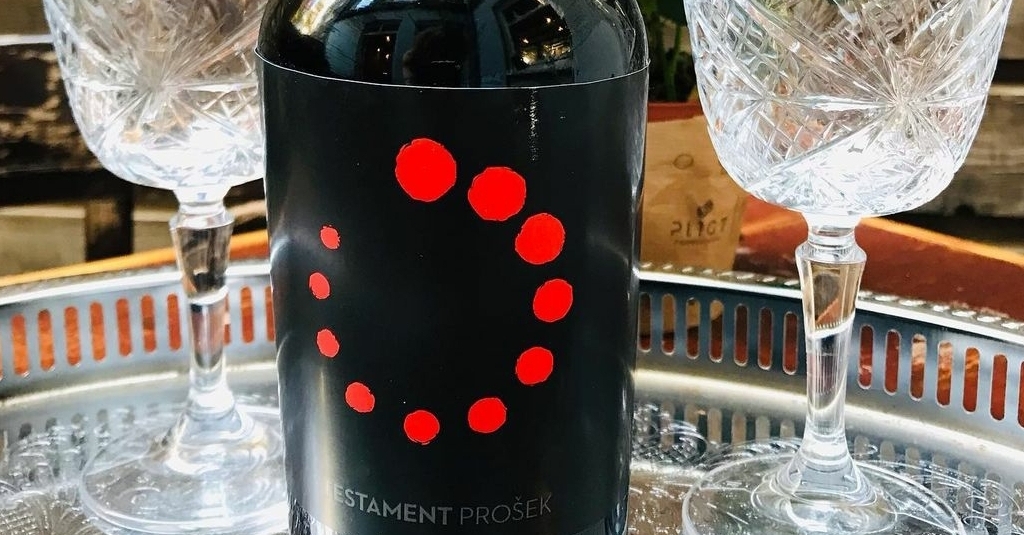
Are you looking for a delicious and unique wine experience? Look no further than Testament Winery in Northern Dalmatia! In the heart of a renowned wine-growing region near the charming medieval town of Šibenik, Testament wines are crafted from the indigenous Pošip and Babić grape varieties. These grapes give each bottle a vibrant color, aroma, and flavor that sets them apart.
Crafted using an organic production process and taking advantage of the region’s unique microclimate and soil, Testament wines boast a rich and complex taste that’s simply unmatched.
And if you’re a fan of dessert wines, try out one of the best Croatian Prošek wines – Testament Prošek. This delicately sweet wine is traditionally made with the native Croatian grapes varieties Bogdanuša, Vugava, and Maraština, along with the flagship native red Croatian grapes Plavac Mali and Babić. Remember that it’s not the same as Prosecco, the Italian sparkling wine.
Testament Prošek is made from grapes dried on the vine! Grapes of Babić are picked in mid-November. After 60 days of drying on the vine, grapes are macerated and fermented with natural malolactic fermentation.
TASTING NOTES:
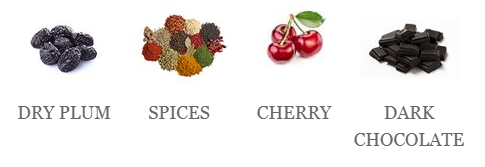
Inspired by tradition, this Prošek is an amazingly balanced sweet red wine – fragrant with dry plum, figs, raisins, dark chocolate, and ripe cherries. The taste is complex, with delicate tannins and integrated freshness as well., figs, raisins, dark chocolate, and ripe cherries. The taste is complex, with delicate tannins and integrated freshness as well.
FOOD RECOMMENDATIONS:
Best served at 13-18 °C (55 – 64°F)

Key Takeaway: Savor the sweet side of Croatia with Testament Prošek, a deliciously balanced, one-of-a-kind traditional dessert wine.
Stina Prošek
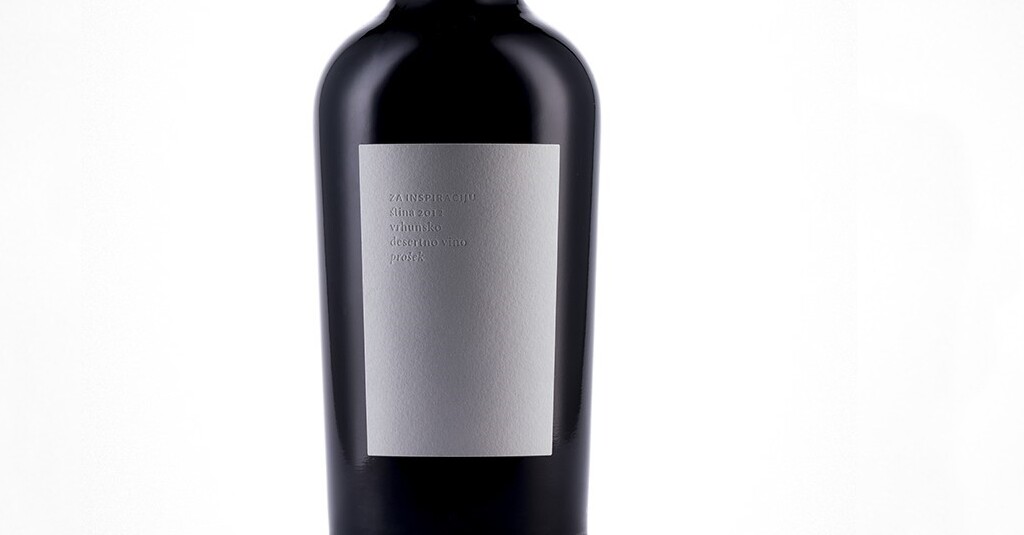
Stina is a brand of wine from the Dalmatian island of Brač, famous for its white stone (in the Dalmatian dialect called Stina).
Stina Prošek is traditional Dalmatian dessert wine valued for its quality and uniqueness. It is produced from the red native wine variety Plavac Mali and the white native variety Pošip, which grow on the southern slopes of the island of Brač at the locations of Smrčevo. Grapes are harvested late, best in the stage of overripe and dried grapes.
It’s worth mentioning that the vineyards on Brač are located along the coast on poor and steep land that is difficult to cultivate, and all the work – from planting to harvesting – is done by hand. That’s because the terrain is so unique. It wouldn’t be possible to do it any other way.
TASTING NOTES:

Two different grape varieties are blended in Stina Prošek:
- ‘red’ (made from Plavac mali) with its richness, power, and aromas of black, jammy fruit,
- and ‘white’ (made from Pošip) with its characteristic sweetness and fruitiness.
Stina Prošek is a sweet, creamy dessert wine, while the scent reveals the full richness of dried fruit, dried grapes, dried figs, and candied citrus peel with a touch of barrique notes. After half a year of separate aging, these two varieties are mixed and kept in wooden casks for at least two years. Prošek rests in the bottle for at least six months before launching on the market. Visit the official website of 1xbet and click on the “Register” button. Fill in the required information, including your name, email address, and password. Make sure to provide accurate details to avoid any issues during the verification process. Since you will not need an actual 1xbet promo code free bet , you will need to accept the offer in the account settings. Upon registration, you will receive a complimentary bet of 130€/$ as a bonus from the renowned bookmaker, 1xBet. This section provides bonus codes specifically designed for sports enthusiasts.
FOOD RECOMMENDATIONS:
Best served at 13-18 °C (55 – 64°F)

Key Takeaway: Enjoying Stina Prošek means truly indulging in local culture. So open your bottle of Stina Prošek and explore all this special Croatian dessert wine has to offer!
Iločki Podrum Gewürztraminer Ice Wine
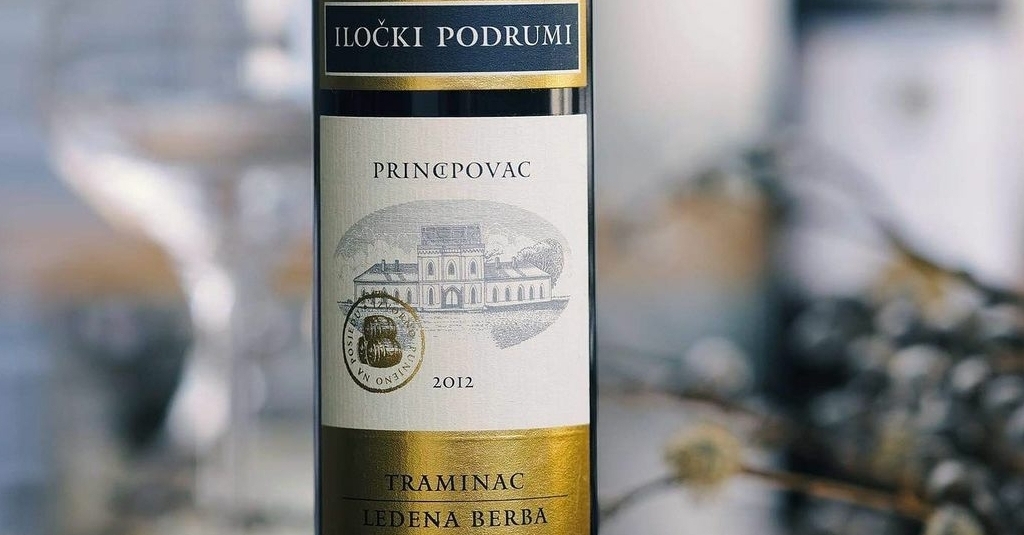
Ice wine, also known as Eiswein in German, is a special dessert wine that comes from frozen grapes while on the vine. Due to the particular weather conditions and cold climates required for its production, ice wine can be fairly pricey.
Making wine is a real challenge, but ice wine takes it to the extreme. Ice wine takes the winemaking process to the next level in search of those silky-smooth fruit flavors. It’s a serious commitment.
The winemakers must keep an eye on the grapes all year round and ensure they’re in the best condition before winter hits. They must cut them off if they see unhealthy bunches during the summer and fall. Those grapes that stay on the vine shrink and lose moisture as the temperatures drop, intensifying their flavors and sugars.
But wait, there’s more – those precious grapes must be protected from all the hungry birds and other animals, so they must be covered in the protective net.n And, the biggest test of all? The grapes have to stay on the vine until they freeze, usually until the middle of the night in late January or early February. Of course, there’s always the risk that a mild winter or gusty winds could ruin everything. But, despite all the obstacles, ice winemakers keep pushing forward, always searching for the sweetest possible reward.
Iločki Podrumi (Ilok Cellars) is a Croatian winery with a wealth of knowledge and tradition. Over time Ilok Cellars harvested an immense amount of awards and recognition, making them a symbol of Croatian wine-making culture.
The winery specializes in producing dessert wines from Graševina and Gewürztraminer grape varieties. Wines come from the vineyards positioned on the western slopes of Fruška Gora, which gently descend towards the majestic Danube river. A visit to these award-winning cellars should definitely be on every lover of Croatian wines’ bucket list!
The harvest of these precious sweet berries belongs to the peak of wine production. The prerequisite for ice wine status by Croatian Law on wine is:
- harvesting the grapes at a temperature below minus 7 °C (44°F) that lasts for at least three days,
- the berries must be frozen while they are being processed,
- such must contain at least 127 Oechsl.
This kind of harvesting usually takes place at the end of December or the beginning of January. Lots of sunshine and little rainfall during autumn favor high percentages of grape sugar, which are thought to be perfect conditions for excellent ice harvest. Few vineyards situated in the continental part of Croatia can boast of such conditions.
TASTING NOTES:
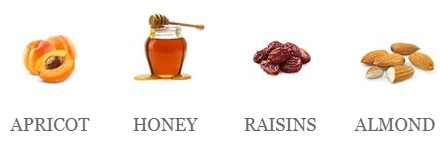
This wine is made from frozen grapes picked carefully during the coldest days on the Principovac appellation. This wine is of exceptional quality with a sensational gold-yellow to amber color. The wine is rich, creamy, and complex, with intensive honey notes.
FOOD RECOMMENDATIONS:
Best served at 10-12 °C (50-54°F)

Key Takeaway: Get ready to taste the world-renowned dessert wines made from the exquisite Gewürztraminer variety. Experience the rich tradition and knowledge that makes Iločki Podrumi a true symbol of Croatian wine-making culture.
Bodren Chardonnay Ice Wine
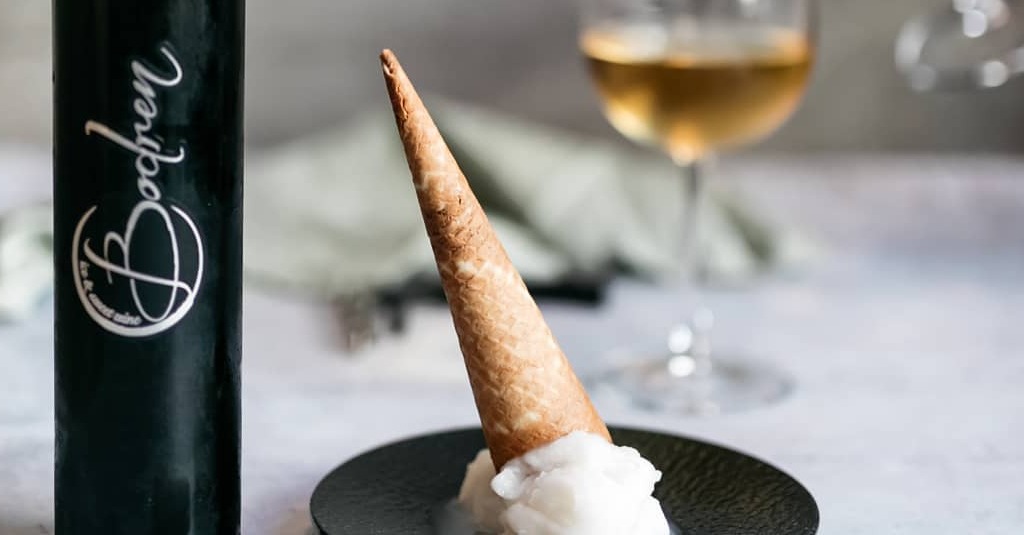
Bodren is a synonym for supreme wine predicates. The winery has spread its vineyards in a region of absolute ecological attributes, on rested hills of the gentle Hrvatsko Zagorje.
Trockenbeerenauslese and Ice wine from Bodren have a concentrated, harmonious aroma like honey from a meadow. Vibrant acidity balances out the sweetness, giving these wines a light and refreshing feel.
Imagine sipping on a wine that has just the perfect touch of botrytis and feels refreshingly light. That’s what these top-notch dessert wines are all about! Made in limited quantities from hand-picked grapes that are carefully chosen and ripened to perfection, and they’ve got that extra something. And the best part? The low alcohol content makes it feel “medicinal.”
TASTING NOTES:

A delicate, rounded, and elegant ice wine of golden color with an amber hue. A pronounced luscious fruitiness beautifully balances citrus freshness. Plus, a touch of vanilla perfectly complements the wine.
FOOD RECOMMENDATIONS:
Best served at 10-12 °C (50-54°F)

Key Takeaway: Bodren’s ice wines have earned a reputation for excellence, consistently winning international awards. Imagine sipping on a bottle of this remarkable wine, handcrafted to perfection with care and passion!
Benvenuti Muscat San Salvatore
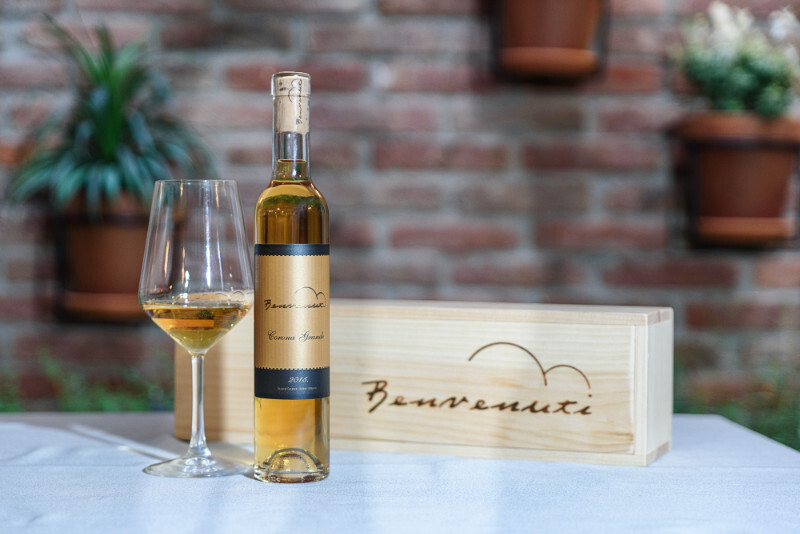
Situated in the picturesque Istrian village of Kaldir, the Benvenuti winery has been producing some of Croatia’s most popular wines made from Malvasia Istriana and Teran, for over a hundred years, with their Muscat San Salvatore being particularly noted.
As one of their two single vineyard wines, this sweet nectar is produced by late-harvesting and air-drying the grapes for three months. This passito method ensures a complex flavor and irresistible sweetness. This precious nectar exceeds expectations, receiving many awards, including trophies and platinum medals from illustrious competitions such as Decanter or IWC.
Whether you prefer dry reds or sweet whites, it’s hard to look past Benvenuti Muscat San Salvatore when choosing Croatian wines.
TASTING NOTES:

Micro location, San Salvatore, 400 meters above sea level, has provided a complex sweet wine with a full body with a deep golden color. The aromatic profile on the nose opens with smells of dried apricots, honey, dried flowers, and orange jam. On the taste, wine has distinct aromas of lychee, candied rose petals, honey, and nuts. The taste is sweet, thick, and intense, without weight, with excellent balance and long duration. Benvenuti Muscat San Salvatore is the type of dessert wine that can be stored for decades, during which time the quality will only continue to develop. Therefore, it is designed as a wine for special moments or a gift for important life situations.
FOOD RECOMMENDATIONS:
Best served at 10-12 °C (50-54°F)

Key Takeaway: The unique production process of late-harvesting and air-drying the grapes made in the passito method results in platinum awards from the prestigious Decanter and IWC competitions for Benvenuti Muscat San Salvatore.
Kabola Momjan Muscat
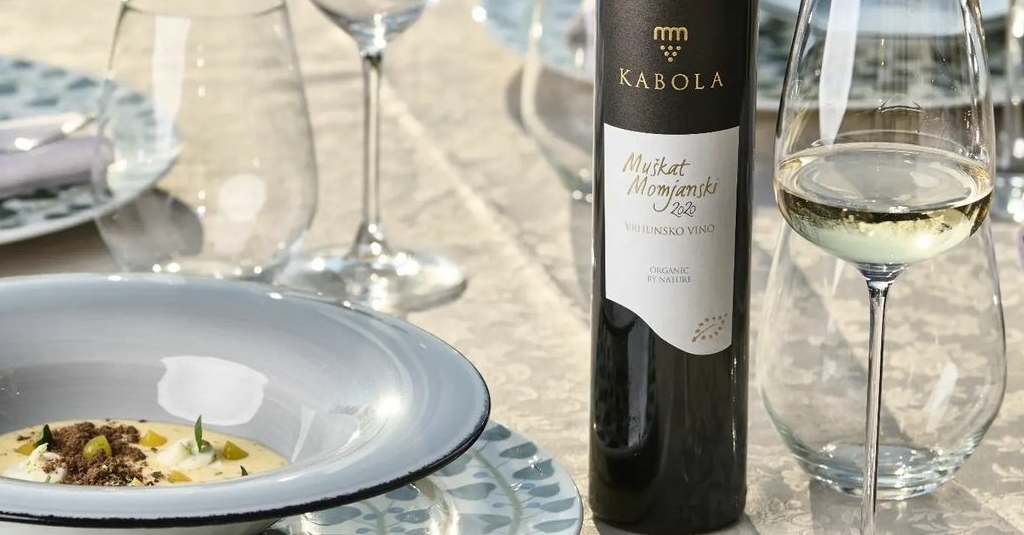
Kabola Winery is situated in the northwestern Istrian peninsula at 275m above sea level, with a view of the Alps and the Dolomites on one side and the lush greenery of pristine nature and a beautiful sea panorama on the other.
Kabola Winery is situated in the northwestern Istrian peninsula at 275m above sea level, with a view of the Alps and the Dolomites on one side and the lush greenery of pristine nature, a beautiful sea panorama on the other.
Their vineyards are located on Stancija hill near the winery in Kanedolo near Momjan. The soil consists mainly of clay and is rich in marl, giving the wines unique characteristics. Through shorter or more extended maceration in oak barrels and amphorae, Kabola wines gain special notes.
Muscat from Momjan is an autochthonous variety of Momjaština, a micro-region in the Istria Peninsula. Thanks to its location and microclimate, it represents a unique grape variety worldwide.
TASTING NOTES:
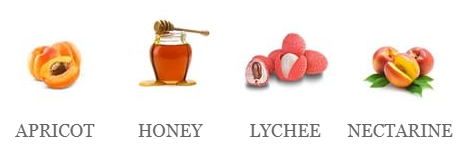
Delicious, harmonious, medium-bodied wine with intense flavor and a long finish. The wine has a greenish-yellow color with golden highlights. On the nose, it is highly aromatic, rich, and playful. Dominated by flowery notes of white rose and followed by fresh fruit notes such as vineyard peach, lychee, and nectarine with a touch of sage honey and notes of apricot at the aftertaste. The wine is semi-dry, partly warm and soft, with a lovely freshness and a touch of minerality.
FOOD RECOMMENDATIONS:
Best served at 8-10 °C (46 – 50°F)

Key Takeaway: Look no further than this award-winning winery for a special treat. Whether it’s an ideal dinner companion or a new favorite dessert wine, Kabola Momjan Muscat is like an invitation to taste Croatia itself!
Korlat Merlot Boutique
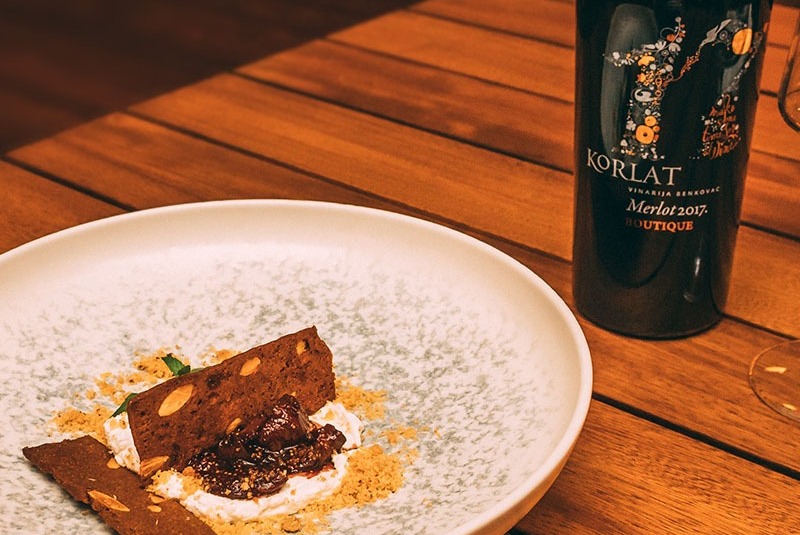
Korlat is a unique selection of labels from the Benkovac winery as part of Badel 1862. The primary line consists of international varieties: Cabernet Sauvignon, Merlot, and Syrah, and the numerous awards won by these wines in the previous years are proof of wine excellence. The strictly limited number of labels of this separate part of the winery is called stone wines.
The sizzling sun and dry, windy ground of Benkovac – Stankovci vineyard appellations are responsible for the colorful character of Korlat wines.
Limited edition of Korlat Merlot Boutique sweet wine is produced ecologically by the traditional method of drying grapes on the vine. This wine is made by letting the grapes bask in the sun for a longer than the usual harvest. This extra love and attention concentrate all the grapes’ flavors, aromas, and sweetness, resulting in a seriously intense and delicious wine.
The sizzling sun and dry, windy ground of Benkovac – Stankovci vineyard appellations are responsible for the colorful character of Korlat wines.
Limited edition of Korlat Merlot Boutique sweet wine is produced ecologically by the traditional method of drying grapes on the vine. This wine is made by letting the grapes bask in the sun for a longer than the usual harvest. This extra love and attention concentrate all the flavors, aromas, and sweetness in the grapes, resulting in a seriously intense and delicious wine.
TASTING NOTES:

A sumptuous and complex wine with deep red color with purple highlights. This wine has complex aromatics, primarily dominated by the jammy aromas of blackberries, with subsequent associations with vanilla and a mild dose of spices. The wine is equally complex, dense, and rich on the palate, with a controlled sweetness and a long duration.
FOOD RECOMMENDATIONS:
Best served at 13-18 °C (55 – 64°F)

Key Takeaway: Indulge in the unique and intense taste experience of Korlat’s limited edition Merlot Boutique sweet wine, sun-dried to perfection.
FAQs About Croatian Sweet Wines
What is the best Croatian dessert wine?
Muscat San Salvatore from the Benvenuti winery in the Istrian village of Kaldir is considered one of the best Croatian dessert wines.
Made from late-harvested grapes, this sweet nectar is produced through the passito method resulting in a complex flavor and irresistible sweetness. The Muscat San Salvatore has received numerous awards, including trophies and platinum medals, from renowned competitions such as Decanter and IWC.
In Continental Croatia, the concentration of natural sugar is achieved by late harvesting and the ultimate dessert wines – “ice wines”. One of the best continental Croatian dessert wines is produced by Iločki Podrumi (Ilok Cellars), a renowned winery with a rich history and tradition in wine-making.
Iločki Podrumi specializes in producing dessert wines known as Ice wines from Graševina and Gewürztraminer grape varieties. Visit these award-winning cellars to taste their unique dessert wines is a must! This winery is a symbol of the Croatian wine-making culture.
Is Croatian wine sweet?
Croatian winemakers produce dessert wines which are usually sweet due to their natural ripening process and residual sugar left over after fermentation. From the Slavonia and Danube wine region to Istria and Dalmatia, the country boasts various wines suited to call them sweet.
Perhaps the most famous Croatian continental dessert wines are made from native Graševina and the Traminac variety, also known as Gewurztraminer.
Moving over to Istria, native Muscat or Muškat Momjanski wines take center stage regarding sweet character.
And then there’s the Dalmatia wine region renowned for its Prošek, traditional dessert wine. If you want to sample Croatian wines for yourself, look for a Croatian winery that offers varieties of dessert wine – and don’t forget to check out the “Prošek!
Whether made from indigenous or international grapes, Croatian dessert wines deliver flavor and a unique experience. As if that needed to be more convincing, these wine selections can range from late harvest to ice wines giving you a variety like few other countries can offer!
What is Prosek wine?
Prosek (or “Prošek” in Croatian) is the most well-known Croatian dessert wine. It can sometimes be hard to find, but a few wineries in Dalmatia produce some exquisite “Prošek” wines! If you want a taste of a traditional Croatian treat, try this special dessert wine – sometimes made with grapes left to dry on the vine (dried grapes) and usually a blend of several varieties.
Despite its name, it has nothing to do with the Italian Prosecco, a sparkling wine. There are no similarities between the products regarding the production method, style, or the grapes used, nor is there any relation between the origins of the two names.
Famous sweet white Croatian wine?
Native Muscat (Muškat) Momjanski from Istrian winemakers, such as Kabola, Benvenuti, and Kozlović, are popular sweet white Croatian wines.
Wineries Kutjevo and Ilok produce some of the most popular sweet white wines – Ice wines – from native Graševina and Gewürztraminer (Traminac).
Croatian Uplands wineries also deliver recognizable sweet white wines made from late-harvest, berry harvest, selected berry harvest, or selected dried berry harvest grapes, and even Ice wines. The best example is Ice Wine made from the Chardonnay grape variety from Bodren winery.
If you want to know more about Croatian wine, don’t forget to attend one of their many fantastic wine-tasting events or festivals, which offer the perfect opportunity to learn more and sample the best Croatian wines.
Conclusion
If you’re a fan of wine, then you are surely going to love Croatian dessert wines! These sweet treats come from different Croatian wine regions and offer an extraordinary experience tantalizing your taste buds. Winemakers in Croatia have a particular affinity for producing delicious dessert wines, no matter the lengthy and labor-intensive process it takes to get them just right.
Croatian dessert wines are making waves in the wine world, racking up awards and recognition at prestigious wine evaluations! They may surprise any wine enthusiast with their quality and deliciousness. It is essential that extra attention is paid to detail during the ripening and harvesting of the grapes to create a truly unique flavor.
These sweet treats are a labor of love, with grapes either left on the vine to ripen naturally to be harvested in Autumn to January, or dried to perfection on the wine as in the case with Prošek. The result is a tiny yield of sweet wine worth its price tag. So, if you’re a fan of dessert wines, Croatian sweet wines are a must-try!
